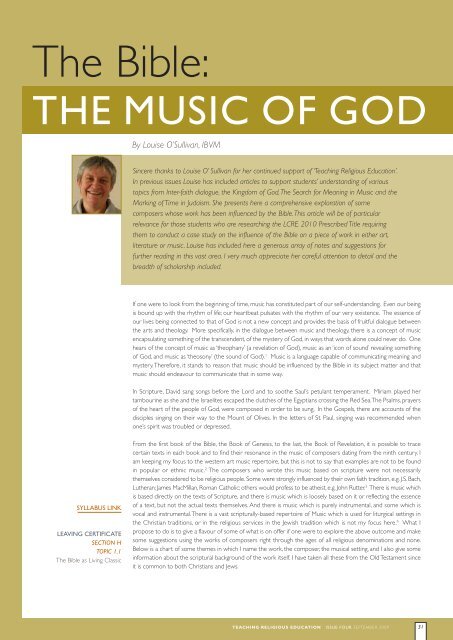TeachingRE Issue 4.pdf - the Second Level Support Service
TeachingRE Issue 4.pdf - the Second Level Support Service
TeachingRE Issue 4.pdf - the Second Level Support Service
Create successful ePaper yourself
Turn your PDF publications into a flip-book with our unique Google optimized e-Paper software.
The Bible:THE MUSIC OF GODBy Louise O’Sullivan, IBVMSincere thanks to Louise O’ Sullivan for her continued support of ‘Teaching Religious Education’.In previous issues Louise has included articles to support students’ understanding of varioustopics from Inter-faith dialogue, <strong>the</strong> Kingdom of God,The Search for Meaning in Music and <strong>the</strong>Marking of Time in Judaism. She presents here a comprehensive exploration of somecomposers whose work has been influenced by <strong>the</strong> Bible.This article will be of particularrelevance for those students who are researching <strong>the</strong> LCRE 2010 Prescribed Title requiring<strong>the</strong>m to conduct a case study on <strong>the</strong> influence of <strong>the</strong> Bible on a piece of work in ei<strong>the</strong>r art,literature or music. Louise has included here a generous array of notes and suggestions forfur<strong>the</strong>r reading in this vast area. I very much appreciate her careful attention to detail and <strong>the</strong>breadth of scholarship included.If one were to look from <strong>the</strong> beginning of time, music has constituted part of our self-understanding. Even our beingis bound up with <strong>the</strong> rhythm of life; our heartbeat pulsates with <strong>the</strong> rhythm of our very existence. The essence ofour lives being connected to that of God is not a new concept and provides <strong>the</strong> basis of fruitful dialogue between<strong>the</strong> arts and <strong>the</strong>ology. More specifically, in <strong>the</strong> dialogue between music and <strong>the</strong>ology, <strong>the</strong>re is a concept of musicencapsulating something of <strong>the</strong> transcendent, of <strong>the</strong> mystery of God, in ways that words alone could never do. Onehears of <strong>the</strong> concept of music as ‘<strong>the</strong>ophany’ (a revelation of God), music as an ‘icon of sound’ revealing somethingof God, and music as ‘<strong>the</strong>osony’ (<strong>the</strong> sound of God). 1 Music is a language capable of communicating meaning andmystery.Therefore, it stands to reason that music should be influenced by <strong>the</strong> Bible in its subject matter and thatmusic should endeavour to communicate that in some way.In Scripture, David sang songs before <strong>the</strong> Lord and to soo<strong>the</strong> Saul’s petulant temperament. Miriam played hertambourine as she and <strong>the</strong> Israelites escaped <strong>the</strong> clutches of <strong>the</strong> Egyptians crossing <strong>the</strong> Red Sea.The Psalms, prayersof <strong>the</strong> heart of <strong>the</strong> people of God, were composed in order to be sung. In <strong>the</strong> Gospels, <strong>the</strong>re are accounts of <strong>the</strong>disciples singing on <strong>the</strong>ir way to <strong>the</strong> Mount of Olives. In <strong>the</strong> letters of St. Paul, singing was recommended whenone’s spirit was troubled or depressed.SYLLABUS LINKLEAVING CERTIFICATESECTION HTOPIC 1.1The Bible as Living ClassicFrom <strong>the</strong> first book of <strong>the</strong> Bible, <strong>the</strong> Book of Genesis, to <strong>the</strong> last, <strong>the</strong> Book of Revelation, it is possible to tracecertain texts in each book and to find <strong>the</strong>ir resonance in <strong>the</strong> music of composers dating from <strong>the</strong> ninth century. Iam keeping my focus to <strong>the</strong> western art music repertoire, but this is not to say that examples are not to be foundin popular or ethnic music. 2 The composers who wrote this music based on scripture were not necessarily<strong>the</strong>mselves considered to be religious people. Some were strongly influenced by <strong>the</strong>ir own faith tradition, e.g. J.S. Bach,Lu<strong>the</strong>ran; James MacMillan, Roman Catholic; o<strong>the</strong>rs would profess to be a<strong>the</strong>ist, e.g. John Rutter. 3 There is music whichis based directly on <strong>the</strong> texts of Scripture, and <strong>the</strong>re is music which is loosely based on it or reflecting <strong>the</strong> essenceof a text, but not <strong>the</strong> actual texts <strong>the</strong>mselves. And <strong>the</strong>re is music which is purely instrumental, and some which isvocal and instrumental.There is a vast scripturally-based repertoire of Music which is used for liturgical settings in<strong>the</strong> Christian traditions, or in <strong>the</strong> religious services in <strong>the</strong> Jewish tradition which is not my focus here. 4 What Ipropose to do is to give a flavour of some of what is on offer if one were to explore <strong>the</strong> above outcome and makesome suggestions using <strong>the</strong> works of composers right through <strong>the</strong> ages of all religious denominations and none.Below is a chart of some <strong>the</strong>mes in which I name <strong>the</strong> work, <strong>the</strong> composer, <strong>the</strong> musical setting, and I also give someinformation about <strong>the</strong> scriptural background of <strong>the</strong> work itself. I have taken all <strong>the</strong>se from <strong>the</strong> Old Testament sinceit is common to both Christians and Jews.TEACHING RELIGIOUS EDUCATION ISSUE FOUR SEPTEMBER 200931


